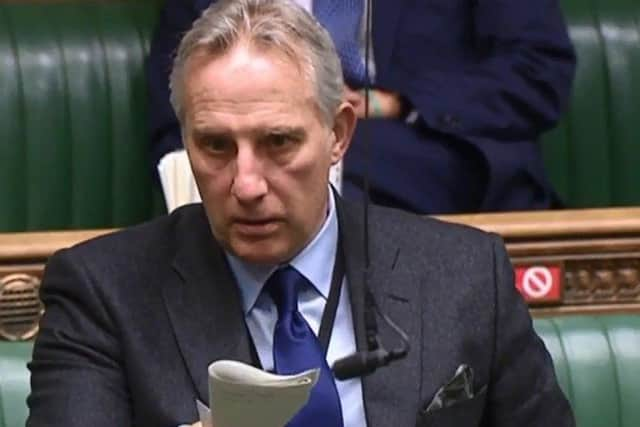Ian Paisley Jr Bill aims to add super-majority requirement to border poll on united Ireland
and live on Freeview channel 276
The DUP MP has proposed specific turnout requirements that would mean a straightforward "50% plus one" majority in favour of a united Ireland would not be enough to see Northern Ireland leave the UK and join with the Republic.
The North Antrim MP pointed to recent comments from the Republic of Ireland's Tanaiste, Leo Varadkar, who was met with boos during a recent conference in Dublin on the possibility of a united Ireland when he suggested a simple, narrow majority should not be enough for such a large change.
Advertisement
Hide AdAdvertisement
Hide AdMr Paisley’s Bill would also have implications for the Scottish independence campaign.


He said he introduced it after witnessing the "sense of unhappiness" that emerged when the Brexit referendum passed in 2016 with a "very narrow majority" in favour of leaving the EU, but insisted that issue cannot be revisited.
At present, the Good Friday Agreement states that a united Ireland can occur with the "agreement and consent of a majority of the people of Northern Ireland".
Mr Paisley has proposed, specifically, a turnout requirement that would mean at least 50% of the total eligible electorate must vote in favour of a united Ireland for it to pass.
He also suggested "additional protections" could be added.
Advertisement
Hide AdAdvertisement
Hide AdThe North Antrim MP said: "It has long been recognised, including by figures such as Leo Varadkar, that 50% plus one is not a recipe for stability My Bill concurs and proposes that 50% plus one can only constitute a sufficient majority to end a union that has lasted for over two hundred years, if at least 50% of those entitled to vote, vote in this way. There should arguably be additional protections."
His Bill, Mr Paisley said, is intended to "facilitate a conversation" about how future constitutional referenda might work.
He explained: “I have been moved to take this step having witnessed the acrimony following the UK’s departure from the European Union on a very narrow majority.
"The sense of unhappiness following that decision, which only related to an external relationship which lasted less than 50 years, has set me thinking about what might happen in the event of referenda that would seek to terminate internal UK relationships that have been in place from between more than two hundred and twenty years, in the case of Northern Ireland, over three hundred years, in the case of Scotland, and nearly five hundred years, in the case of Wales and nearly five hundred years in the case of England.
Advertisement
Hide AdAdvertisement
Hide Ad“While we cannot revisit the Brexit referendum, it seems to me that going forward we need a much better understanding of what would constitute a fair expression of national consent for dissolving our United Kingdom.”
He continued: “At this point some might be thinking to themselves: ‘Given that no Parliament can bind its successors, what use is a general bill concerned with potential future referenda on the place of nations within the union?’ That observation is correct in so far as it goes but this is an issue we cannot afford to leave entirely to the moment, when necessarily our attention is more absorbed with the question about whether a referendum should take place than what constitutes a legitimate manifestation of consent for a constituent nation of the United Kingdom to dissolve it.
“We need to have a conversation now, when the question of whether there should be a specific referendum is not urgently pressing itself upon us, to ask that other key question, what constitutes a legitimate manifestation of consent for this change whether that is in England, Scotland, Wales or Northern Ireland.”
He added: My Bill can facilitate a conversation about these matters and, while (unless Parliament agrees to an entrenchment clause) it will not bind future Parliaments, I hope it will influence them.
Advertisement
Hide AdAdvertisement
Hide Ad"Rather than repeat the mistakes of the past, we must learn lessons.
"Whilst my Bill is now introduced, I will engage with stakeholders around the United Kingdom about how it should be shaped going forward. Our goal must be stability across the United Kingdom, not further instability.”